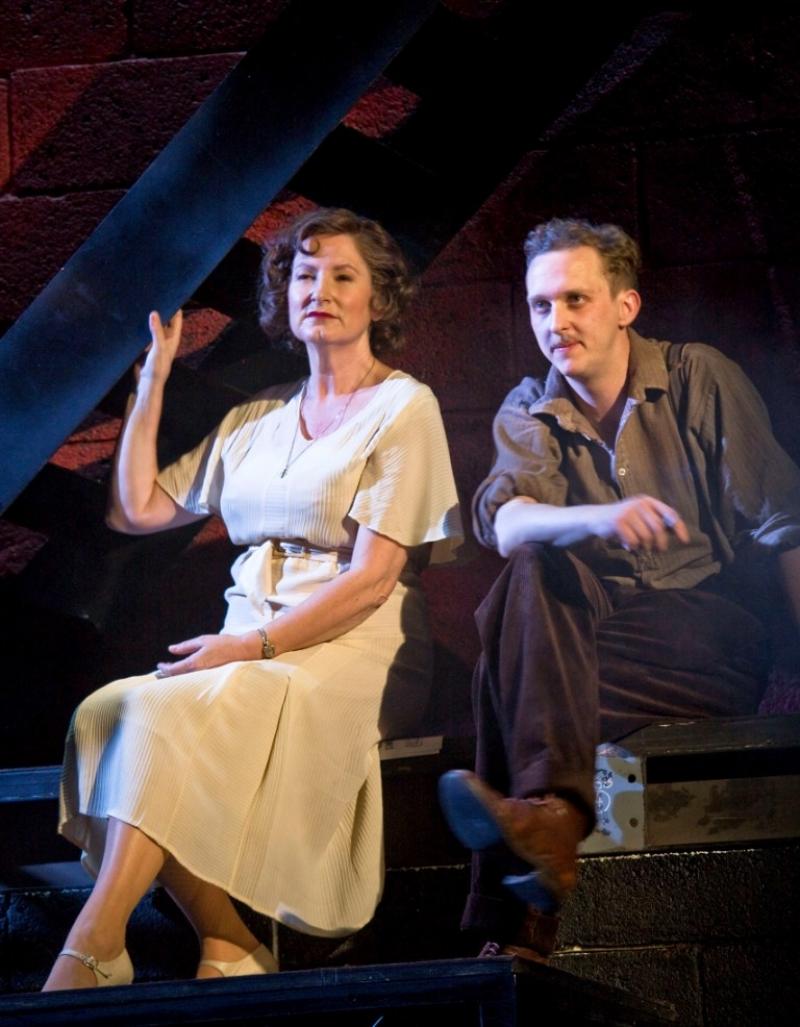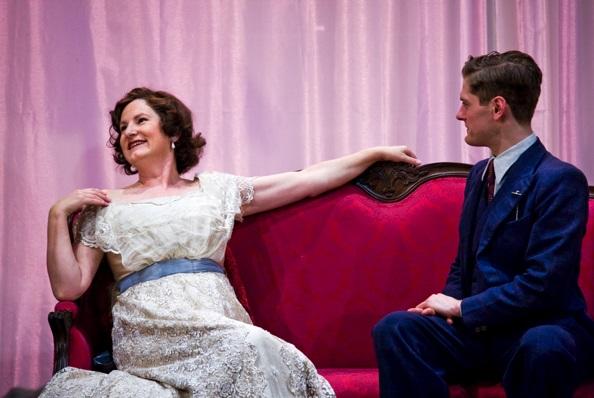Just about the time you're losing patience with the Young Vic revival of Tennessee Williams's The Glass Menagerie - wondering at some of the variable accents and directorial overembellishments and the heavy sledding accompanying this most fragile and beautiful of plays - along comes one of the great, prolonged encounters of all 20th-century drama: that between an emotionally indrawn, "crippled" (in more ways than one) young woman and the scarcely less damaged swain who all too briefly offers salvation in a natty suit. And suddenly, as another character in a later Williams play would go on to remark, there's God so quickly, and this chamber piece about disappointments writ small and also crushingly large delivers its fully wounding power anew.
That means waiting after the interval for the full force of a play that surely rivals anything in Chekhov when it comes to a comprehensively bleak aspect that gets summed up minutes before the end in the matriarch Amanda Wingfield's view of events: "Things have a way of turning out so badly." The irony, at least in Joe Hill-Gibbins's production, is that Amanda's clear-eyed assessment follows an extended scene in which pretty much everything goes right, which is to say a study in human possibility and prospects that are made available for a time and then cruelly snatched from sight for keeps. No wonder that this play, rooted in its author's own, abiding despair at the fate of the sister, Rose, whom he so loved, seems written in the same combination of "tears and blood" famously applied to a second, subsequent American masterwork, O'Neill's Long Day's Journey into Night.
Like Long Day's Journey and its defining quartet of roles (that play offers up a fifth character in the family maid), Menagerie sets a challenge for a director who needs to align four characters at varying points on a sometimes humorous but ultimately devastating spectrum of loss.
Flirtatiousness doesn't come naturally to Findlay, though she gets Amanda's shrewdness precisely right
Not for nothing are we informed near the play's start of the "sentence" that has pretty well been passed against the Wingfield clan: mother Amanda (Deborah Findlay), a yammering but, in her way, gallant fusspot who is also immensely shrewd about things when it suits her to be; son Tom (Leo Bill), a poet and dreamer who seeks permanent escape from the half-light of the St Louis tenements and is known to his colleagues at the warehouse where he works as Shakespeare; and Laura (Sinéad Matthews), two years Tom's senior but in emotional terms a child-woman who takes refuge and solace in her collection of glass figurines, and who blooms, however briefly, in the company of the second act's Gentleman Caller, aka Jim O'Connor (Kyle Soller, in the performance of the production). He is someone on whom Laura has doted from afar at school, and he arrives for dinner with the Wingfields like Prince Charming on some unseen chariot, only to reveal bit by bit that this ever-smiling golden boy has, too, felt life's heedless blows.
Hill-Gibbins delivered one of this year's stand-out productions to date in his summer revival at the same address of The Beauty Queen of Leenane, the Martin McDonagh play that offers its own response to The Glass Menagerie in the destructive symbiosis of a mother and daughter and a male outsider whose redemptive potential proves short-lived. If he's not as wholly successful here, that owes at least something to the conundrum posed by Williams's text itself, which comes shot through with instructions to a director that most interpreters choose to ignore.
Not here. In accordance with Williams's demands for music, we find an original score for the theatre from Oscar-winner Dario Marianelli (Atonement) played by Simon Allen and Eliza McCarthy, who sit perched above a Jeremy Herbert set rife with curtains and both confused and confusing when it comes to dealing with such issues as how the characters actually enter and exit the cramped quarters where the play takes place. (At least two such moments don't read visually at all, not least the crucial sequence in which the heartsick Laura refuses to go to the door to let her brother and Jim into the house.) Marianelli's music, meanwhile, functions as portentous underscoring that this play really doesn't need, not least because Williams's language is so innately musical in itself.
 There's a neat visual gag at the very beginning when the restless Tom (Leo Bill, pictured right with Findlay) lights up a cigarette in front of a "No Smoking" sign, indicating from the start this literary rebel with a cause, which is to attempt somehow to redeem the sister who would never know the release that Williams's surrogate in the play finds in language. And Bill, an arresting actor who has lost none of the vocal huskiness he displayed earlier this year in Posh, doesn't yet ride the waves of the often bitter poetry, at once fluent and mournful, in which this role comes steeped; his lachrymose take on the final speech is, I think, a mistake (though, to be fair, the inimitable Ben Chaplin pulled off precisely that in the 1990s Donmar revival of this same play).
There's a neat visual gag at the very beginning when the restless Tom (Leo Bill, pictured right with Findlay) lights up a cigarette in front of a "No Smoking" sign, indicating from the start this literary rebel with a cause, which is to attempt somehow to redeem the sister who would never know the release that Williams's surrogate in the play finds in language. And Bill, an arresting actor who has lost none of the vocal huskiness he displayed earlier this year in Posh, doesn't yet ride the waves of the often bitter poetry, at once fluent and mournful, in which this role comes steeped; his lachrymose take on the final speech is, I think, a mistake (though, to be fair, the inimitable Ben Chaplin pulled off precisely that in the 1990s Donmar revival of this same play).
Findlay, too, gives off a practical, pragmatic air that seems at fundamental odds with the extraordinary creation that is Amanda: a slight (of build), ever feisty combatant who won't let her own spousal abandonment stand in the way of concern for the two children whom she risks losing forever, at least in the case of Tom. Findlay gets the woman's bursts of clarity precisely right: her admission late on that Amanda understands full well "the tyranny of women" before proceeding to display that very tyranny to Tom in front of our eyes. But the flirtatiousness, the retreating back to and away from the past, doesn't land naturally with Findlay any more than does an accent that at certain words ("job", for one) suddenly sounds very English indeed.
All comes right once Jim enters the scene, Soller's amiability at once unforced, infectious, and gently flecked by the realisation that, barely in his twenties, this once shining star's finest days are behind him. (That explains Jim's palpable excitement at the extent of the shadow that he casts on the Wingfields' wall.) For all that Williams's published text rather disingenuously refers to the Gentleman Caller as "nice [and] ordinary", Soller makes a case for the very real complexity of this play's lone outsider, the word "stumble-john" carrying with it the force of those aspersions to the self that course through Chekhov.
And despite a wig that makes her look disconcertingly like some mid-western American cousin to Elena Roger's Fosca in Passion, the diminutive Matthews thankfully doesn't play Laura's limp, as if her disability were all. (Williams in fact tells us that her halting gait "need not be more than suggested".) Instead, she radiates a spirit that finds its one chance to soar - she's heartbreaking when she refers to Jim by a bygone term of endearment, "Freckles" - only to be stopped short, perhaps never to emerge again. After this pair's abortive rendezvous ends, Williams soon concludes his play, as if he, too, knew that some passages in the theatre are hard to top. All that's left is for Amanda to announce life's woes as a permanent condition and for Tom to do his best to move on - which, as the very fact of this play's existence proves, he (and Williams) could not do, and our theatre is lastingly better and richer for it.















Add comment